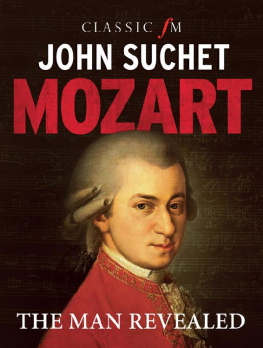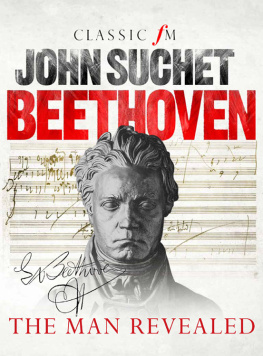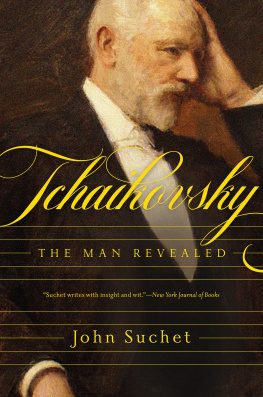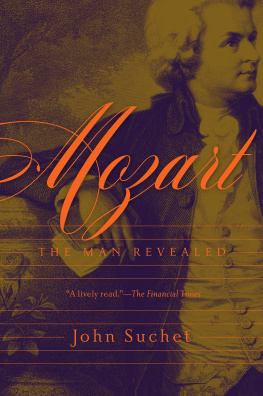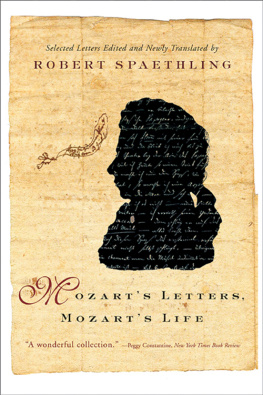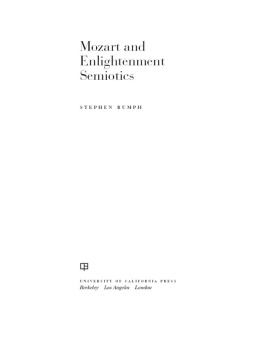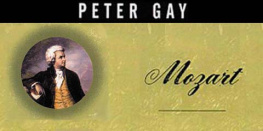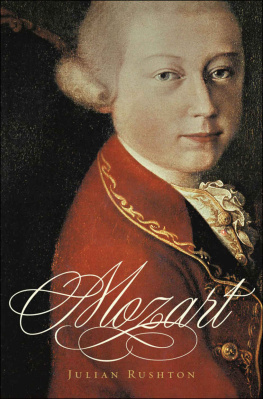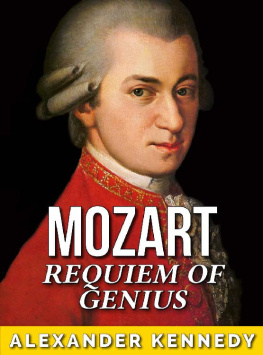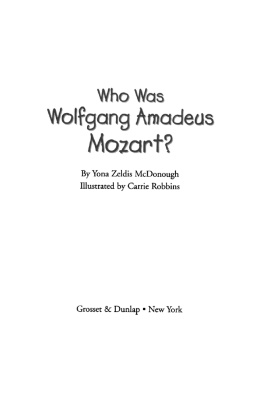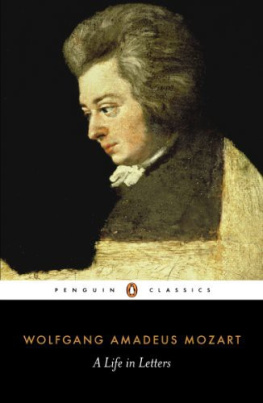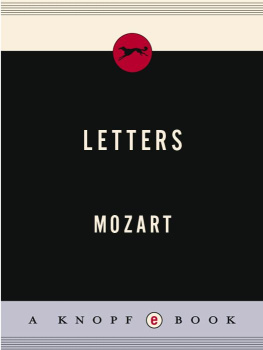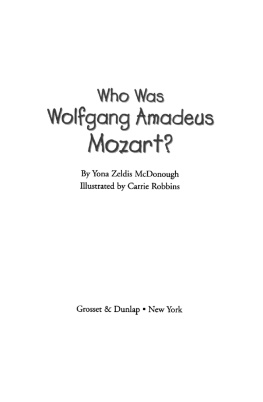

This book is dedicated to the memory of James Black.
Lover of Mozarts music and chronicler of his life.




Mozart the man is easy to understand. Mozart the genius is impossible to comprehend.
The story of his life is well known. Austrian-born, with a tyrant of a father who drove him relentlessly, an unhappy marriage to a spendthrift woman, a childlike character ill at ease amid the pomp and aristocratic splendour of the Viennese court, poisoned by his great rival Salieri, which led to an early death that robbed the world of its most instinctive musical genius.
Only the last is true. In this era of mass entertainment, it is possible the most prevalent image we have of Mozart is that portrayed in the hugely successful film Amadeus. Like the plot of the film, and the play from which it was adapted, the character is largely fictitious, or at least grossly exaggerated.
One element, though, rings totally true. That smile stretching from ear to ear, that uncontrollable laugh, that permanent sense of happiness, of being comfortable with himself and at ease with his genius all that permeated his being.
Musical history is replete with tortured souls, tormented geniuses. Among them is one who can lay claim to be the greatest of them all, given how much he achieved in such a short life. And even if that is disputed, one fact cannot be: despite repeated disappointment at his failure to gain regular paid employment, despite money problems in the final three years of his life, Mozart is surely the happiest composer who ever lived.
Listening to Mozarts music induces a sense of well-being, a feeling that all is well with the world. Whatever is happening outside the concert hall or opera house, if a human being can create such beauty, then there will always be hope for humanity.
Mozart was giving us the benefits of a gift with which he was imbued. He knew it. He did not know where it came from, or why he alone possessed it, but he knew it and he continued to use it. We owe him a limitless debt of gratitude, as will our children, grandchildren, great-grandchildren, and every generation that follows them.
Everything Mozart created exists for us to enjoy. It was a brief life, but we should be eternally grateful that he lived at all.

On 5 September 1842, a year behind schedule something of an embarrassment a monument to Wolfgang Amadeus Mozart was unveiled in the centre of the city of his birth, Salzburg. It had been planned for the year before, the fiftieth anniversary of his death, but had been postponed when a Roman mosaic floor was uncovered during excavation work.
As well as a lasting memorial to Salzburgs most famous son, the monument was also intended as an act of reconciliation. Mozart, like his father Leopold, had come to loathe Salzburg, the archbishop-prince who ruled over it, and indeed its people.
The feeling was entirely mutual, and when Wolfgang left Salzburg for Vienna, never to return, there was something of a collective sigh of relief that this difficult, disobedient although admittedly highly talented musician had finally left.
The monument was a form of belated apology. Mozart should have been better treated by his home town, as people from far and wide had been saying ever since his death. Now Salzburg would be able to point to the huge, imposing monument by a celebrated German sculptor.
The site had been carefully chosen. Mozarts wife Constanze had recently moved to a new apartment in the Michaelsplatz. It was decided the statue would be erected there, and the square renamed Mozartplatz. Constanze would be able to gaze out of her apartment window onto the statue of her husband.
She would not have recognised the larger-than-life-size figure: handsome and serious face, cloak over the shoulder gathered at the waist like a toga, pen in hand. This was not a representation, but a deification.
Two thousand people gathered for the unveiling, many coming from distant parts of the world. Mozarts two sons, Karl and Wolfgang, were there. But their mother was not. During that years delay, she had died at 3.45 a.m. on 6 March 1842, at the age of eighty. She had outlived her husband by more than fifty years.
The other centrally important woman in Mozarts life was not there either. Like Constanze, she would not have recognised the Mozart she knew, her laughing, mischievous brother, in the dignified and imposing figure staring into the distance.
But even if she had been there, Nannerl would not have been able to see the statue. In her final years she slowly became blind. The attractive young girl, a regular beauty whose musical abilities along with those of her younger brother had stunned Europe and who had been labelled a prodigy of nature, was described in her final years as a decay of nature.
Maria Anna Mozart, known throughout her life as Nannerl, had outlived her famous brother by almost forty years, dying thirteen years before the unveiling of the statue at the age of seventy-eight.
One woman was at the unveiling, and she was a totally unexpected guest. In the midst of the ceremony, a very tall, thin and eccentric-looking woman interrupted proceedings by declaiming, Ich bin die erste Pamina! (I am the first Pamina!)
The woman was the celebrated Austrian soprano Anna Gottlieb. More than half a century earlier, when she was just twelve years of age, Mozart had cast her in the role of Barbarina, the gardeners daughter, in The Marriage of Figaro.
Five years later, when she was still only seventeen, her voice was so beautiful that Mozart gave her the all-important role of the steadfastly loyal Pamina, the embodiment of innocence and beauty, in the great creation of his final year, The Magic Flute.
At the time of the unveiling of the statue, Anna was the last singer still alive who had known Mozart.
There were marked similarities to the statue of Beethoven unveiled in his home city of Bonn three years later. Albeit by a different sculptor, it showed a godlike figure, toga thrown over the shoulder, and a pen in the right hand.

Mozart was born on 27 January 1756 in the city of Salzburg. At the time of his birth it was a wealthy city state sitting between Bavaria and Austria, and independent of both. It had grown rich and important on the back of its abundant natural product, salt, which gave it its name, Salz-Burg Salt Castle.
Technically it was part of the Holy Roman Empire of the German Nation, and so loosely speaking was part of Germany. Mozart himself was in no doubt. Throughout his life he referred to himself as German by birth and a German composer.
Next page
